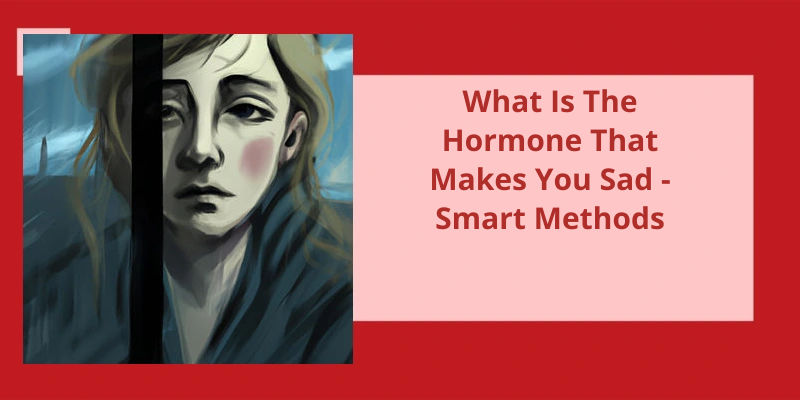Sadness is a complex emotion that can be influenced by various factors, including external circumstances, internal thoughts, and even hormonal imbalances.
Is Dopamine a SAD Hormone?
However, dopamine isn’t specifically linked to sadness. In fact, it’s a more complex role in our emotions and overall mental state. While dopamine is involved in our feelings of pleasure and reward, it isn’t solely responsible for making us feel sad.
Sadness is often associated with a decrease in serotonin levels. Serotonin is a neurotransmitter that helps regulate mood, sleep, and appetite. This is why certain medications, such as selective serotonin reuptake inhibitors (SSRIs), are commonly prescribed to treat these conditions.
It’s important to note that emotions and hormone levels are intricately connected, but they aren’t the sole factors determining our mental state. Various neurotransmitters, including dopamine, serotonin, and others, work together to create a complex interplay of emotions. Additionally, external factors such as life events, stress, and personal circumstances also play a significant role in our emotional well-being.
Instead of focusing on a single hormone as the cause of sadness, it’s better to consider the overall balance of neurotransmitters and the various factors influencing our emotions. Maintaining a healthy lifestyle, seeking support from loved ones or mental health professionals, and practicing self-care can all contribute to improved emotional well-being. While dopamine and serotonin may indeed play a role in our happiness and overall mental state, it’s the holistic approach that truly promotes emotional well-being.
The Role of Serotonin in Mood Regulation
Serotonin is a neurotransmitter that plays a crucial role in regulating mood. It’s often referred to as the “feel-good hormone” because it contributes to feelings of happiness and well-being. Serotonin helps to balance emotions, promote a positive mood, and prevent feelings of sadness or depression.
Low levels of serotonin have been associated with mood disorders such as depression and anxiety. When serotonin levels are low, it can lead to a decrease in overall mood and an increase in negative emotions. Conversely, higher levels of serotonin are often linked to an improved mood and a greater sense of happiness.
In addition to mood regulation, serotonin also impacts other bodily functions, including sleep, appetite, and cognition. It helps to regulate sleep-wake cycles, appetite control, and plays a role in memory and learning processes.
There are various ways to naturally increase serotonin levels, such as engaging in regular exercise, getting plenty of sunlight, practicing relaxation techniques, and maintaining a healthy diet. In some cases, medication may be prescribed to help balance serotonin levels for individuals with mood disorders.
Hormonal imbalances, particularly in estrogen and progesterone, can significantly impact our emotional well-being. These imbalances can lead to difficulties in memory retention, sudden bouts of crying, and unpredictable mood swings that range from profound sadness to sudden happiness. Understanding the effects of these hormonal fluctuations is crucial in promoting overall mental health and well-being.
What Hormone Makes You Sad and Cry?
Hormones can have a profound impact on our emotional well-being. One hormone that’s closely linked to sadness and crying is serotonin. Serotonin is often referred to as the “feel-good hormone” because it plays a crucial role in regulating mood, sleep, and appetite.
Estrogen and progesterone imbalances can also contribute to heightened emotional sensitivity and mood swings. These hormones are crucial in regulating the menstrual cycle and can fluctuate throughout the month. When estrogen levels are low and progesterone levels are high, individuals may experience intense sadness and tearfulness.
There are various factors that can contribute to these emotions, including environmental stressors, personal experiences, and neurochemical imbalances in the brain.
The Impact of Estrogen and Progesterone Imbalances on Emotional Well-Being
- Changes in mood
- Irritability
- Depression
- Anxiety
- Stress
- Mood swings
- Emotional instability
- Difficulty concentrating
- Low self-esteem
- Decreased motivation
- Insomnia
- Loss of interest in usual activities
- Feeling overwhelmed
- Unexplained crying spells
- Increased sensitivity
Depression, a complex mental health condition, can be influenced by various hormones within the body. Fluctuations in estrogen and progesterone levels can potentially lead to depressive episodes, while an elevation in progesterone, such as from using progesterone-only contraceptives, might heighten the risk of depression for certain individuals. Additionally, low levels of testosterone could potentially contribute to feelings of sadness and despair. Understanding the interplay between hormones and depression is crucial in addressing and managing this challenging condition.
What Hormone Makes You Sad?
Depression is a complex condition that can be influenced by various factors, including hormones. While it isn’t accurate to say that there’s a single hormone responsible for making someone sad, certain hormonal imbalances can contribute to the development of depressive episodes.
One important set of hormones that can impact mood are estrogen and progesterone. These hormones play crucial roles in the menstrual cycle and are responsible for regulating various bodily functions. When there’s a drop in estrogen and progesterone levels, such as during premenstrual syndrome (PMS) or menopause, some individuals may experience depressive symptoms. Additionally, taking progesterone-only contraceptives with high levels of progesterone may also increase the risk of depression in certain individuals.
Another hormone that can potentially cause depression is testosterone. Although often associated with males, testosterone is also present in smaller amounts in females. Low testosterone levels in both men and women have been linked to an increased risk of developing depressive symptoms. This highlights the importance of hormonal balance in maintaining overall mental well-being.
It’s essential to note that while hormonal imbalances can contribute to the risk of depression, they aren’t the sole cause.
Understanding the role of hormones in mental health is vital in developing effective treatment strategies for those experiencing depression. Hormone replacement therapy (HRT) or hormone-regulating medications may be prescribed to individuals with hormonal imbalances to help stabilize mood and alleviate depressive symptoms. However, it’s crucial to consult with a healthcare professional to determine the most appropriate treatment approach for each individuals unique situation.
Achieving hormonal balance through various treatment options can be an essential step in managing depression, but it’s crucial to consider the multifaceted nature of the condition and address other factors that may be contributing to an individuals mental well-being.
The Role of Cortisol in Depression: Cortisol Is Known as the “Stress Hormone” and Is Linked to the Body’s Response to Stress. High Levels of Cortisol in the Body for Prolonged Periods Can Contribute to the Development of Depressive Symptoms.
The hormone that makes you sad is cortisol. Cortisol is commonly referred to as the “stress hormone” because it’s released in response to stress. This hormone plays a crucial role in the body’s stress response system. However, when cortisol levels remain elevated for extended periods, it can negatively impact mental health and contribute to the development of depressive symptoms.
The neurotransmitter known as dopamine is often referred to as the “happy hormone” due to it’s ability to induce feelings of well-being. As a key player in the brain’s reward system, dopamine levels surge when we encounter pleasurable experiences.
What Is the Strongest Happy Hormone?
It’s often referred to as the “happy hormone,” dopamine is responsible for giving us feelings of well-being. It acts as a primary driver of the brains reward system, and it’s levels spike when we experience something pleasurable. Dopamine plays a crucial role in motivation, focus, and pleasure, which are essential for maintaining a positive mood.
Endorphins are also powerful happy hormones that our body releases during various activities, such as exercising and laughing. They’re known to reduce pain perception and promote feelings of euphoria and well-being. You may have experienced a “runners high,” which is attributed to the release of endorphins during intense physical activities.
Oxytocin, often referred to as the “love hormone,” is essential for forming social bonds and promoting feelings of trust and connection. It’s released during moments of physical touch, intimacy, and even positive social interactions. Oxytocin not only enhances our sense of happiness but also contributes to overall emotional well-being.
GABA, or gamma-aminobutyric acid, is an inhibitory neurotransmitter that plays a crucial role in controlling anxiety levels. It promotes feelings of relaxation and calmness and helps prevent the excessive firing of neurons that can lead to stress and anxiety. Adequate levels of GABA contribute to a more positive and balanced emotional state.
Lastly, there’s the hormone known as cortisol, often referred to as the “stress hormone.”. While cortisol itself doesn’t make us happy, it’s regulation is essential for maintaining emotional well-being. High levels of cortisol can lead to chronic stress, anxiety, and depression, while balanced levels are necessary for optimal emotional health.
Dopamine, serotonin, endorphins, oxytocin, GABA, and cortisol all contribute to our emotional well-being in different ways. Understanding the roles these hormones play can help us better manage our emotions and take steps towards cultivating a more positive and fulfilling life.
Source: How To Boost Feel-Good Hormones Naturally
In addition to exercise and fulfilling activities, there are several other factors that can activate your happy hormones. Light exposure to sunlight, enjoying some chocolate (in moderation), and focusing on foods high in tryptophan can boost your mood. Playing with pets, hugging or kissing a loved one, and practicing meditation are also effective in promoting the production of happiness hormones.
How Do I Activate My Happy Hormones?
Activating your happy hormones is essential for maintaining a positive mood and overall well-being. There are several factors that can promote the production of these mood-boosting chemicals in your brain. One of the most effective ways to activate your happy hormones is through regular exercise. Physical activity releases endorphins, which are known as the “feel-good” hormones, and can instantly uplift your mood.
Engaging in fulfilling activities that bring you joy and leave a smile on your face is another way to boost your happy hormones. Whether it’s pursuing a hobby, spending time with loved ones, or accomplishing a goal, finding activities that bring you fulfillment and happiness can significantly increase the production of dopamine, serotonin, and oxytocin.
Getting a dose of natural sunlight can also activate your happy hormones. Sunlight exposure triggers the release of serotonin, which helps regulate mood and can alleviate symptoms of depression. So, make sure to spend some time outdoors, especially on sunny days, to soak up those happiness-inducing rays.
Indulging in moderation, dark chocolate can also boost your happy hormones. Chocolate contains phenylethylamine, a chemical that increases endorphin production and promotes a sense of pleasure and well-being. Similarly, focusing on consuming foods high in tryptophan, a precursor to serotonin, can stimulate the production of this important hormone. Foods like turkey, bananas, and nuts are good sources of tryptophan.
Playing with pets can also activate your happy hormones, particularly oxytocin. Interacting with animals has been shown to increase oxytocin levels, which leads to feelings of happiness and reduces stress. Simply spending time with your furry friends can have a profound impact on your mood.
Hugging or kissing a loved one can release a surge of oxytocin, the “cuddle hormone.”. Physical touch, particularly in an intimate and loving context, stimulates the production of oxytocin, promoting feelings of happiness, bonding, and relaxation. Lastly, incorporating meditation into your daily routine can activate your happy hormones. Meditation has been shown to increase the production of serotonin and decrease the production of stress hormones like cortisol, leading to a greater sense of peace and happiness.
The Role of Happy Hormones in Mental Health
Happy hormones, such as serotonin, dopamine, and oxytocin, play a crucial role in maintaining good mental health and well-being. These hormones are responsible for regulating mood, pleasure, and social bonding. When there’s an imbalance or deficiency in these hormones, it can lead to feelings of sadness, anxiety, or depression. It’s important to prioritize activities that boost the production of these happy hormones, such as exercise, socializing, spending time in nature, and practicing self-care. Seeking professional help and guidance can also be beneficial in managing hormone imbalances and maintaining overall mental well-being.
One key hormone that plays a crucial role in regulating mood, appetite, and sleep is serotonin. This hormone has been found to have a connection to feelings of depression, and a lack of sunlight can contribute to lower serotonin levels. In this article, we will explore the importance of serotonin in our well-being and discuss ways to boost it’s production naturally.
What Is the Hormone That Makes You SAD?
One of the hormones that’s closely linked to feelings of sadness is serotonin. Serotonin is a neurotransmitter that plays a crucial role in regulating mood, appetite, and sleep. It’s often referred to as the “feel-good” hormone because it promotes feelings of happiness and well-being.
One of the reasons why serotonin levels may become depleted is a lack of sunlight. When sunlight hits the skin, it triggers a series of chemical reactions that ultimately lead to the production of serotonin. Therefore, during the darker months or in regions with less sunlight, people may experience lower serotonin levels.
The link between sunlight and serotonin levels is particularly relevant in seasonal affective disorder (SAD), a type of depression that typically occurs during the winter months when there’s less sunlight. SAD is characterized by symptoms such as low energy, increased sleep, weight gain, and feelings of sadness or hopelessness.
To combat low serotonin levels and alleviate feelings of sadness, there are several smart methods that can be implemented. One of the most effective ways is to increase sunlight exposure. Spending time outdoors during the day, even when it’s cloudy, can help boost serotonin production. Another method is to engage in regular exercise, as physical activity has been shown to increase serotonin levels.
In addition to external factors, certain lifestyle choices can also impact serotonin levels. Eating a well-balanced diet that includes foods rich in nutrients like tryptophan, which is a precursor to serotonin, can support it’s production. Examples of such foods include turkey, eggs, salmon, nuts, and seeds. Adequate sleep is also crucial for maintaining serotonin levels, so practicing good sleep hygiene is important.
By incorporating these smart methods into our daily routines, we can support healthy serotonin levels and promote overall well-being.
The Role of Serotonin in Mental Health Disorders
Serotonin is a hormone that plays a crucial role in mental health disorders. It’s commonly referred to as the “happiness hormone” because it helps regulate mood, emotions, and feelings of well-being.
When serotonin levels are imbalanced, it can contribute to various mental health conditions, including depression, anxiety, and even some eating disorders. Low levels of serotonin are often associated with depressive symptoms, such as sadness, low mood, and lack of motivation.
By understanding the role of serotonin, researchers and healthcare professionals can develop smart methods to address mental health disorders. Medications like selective serotonin reuptake inhibitors (SSRIs) are frequently prescribed to increase serotonin levels and alleviate symptoms of depression and anxiety. Additionally, practicing self-care, engaging in regular exercise, and maintaining healthy sleep patterns can help support optimal serotonin production and improve overall mental well-being.
In conclusion, serotonin plays a vital role in mental health disorders, and understanding it’s functions can lead to smart approaches for managing and treating these conditions.
Conclusion
In conclusion, understanding the complex relationship between emotions and hormones is crucial in unraveling the mystery of what makes us sad. By adopting smart methods such as stress management techniques, engaging in regular exercise, maintaining a healthy diet, and seeking social support, we can effectively regulate our hormones and promote emotional well-being. It’s through this holistic approach that we can navigate the intricate balance of hormones and emotions, leading to a happier and healthier life.





